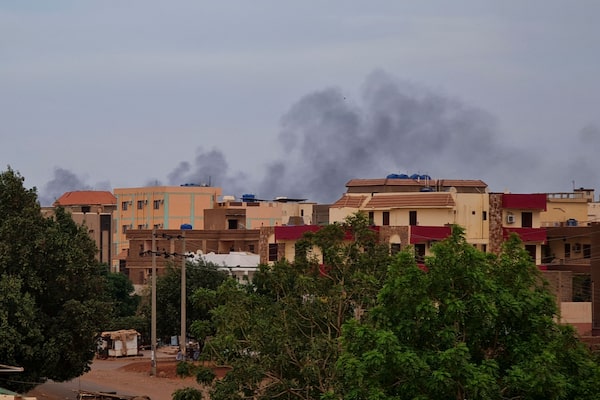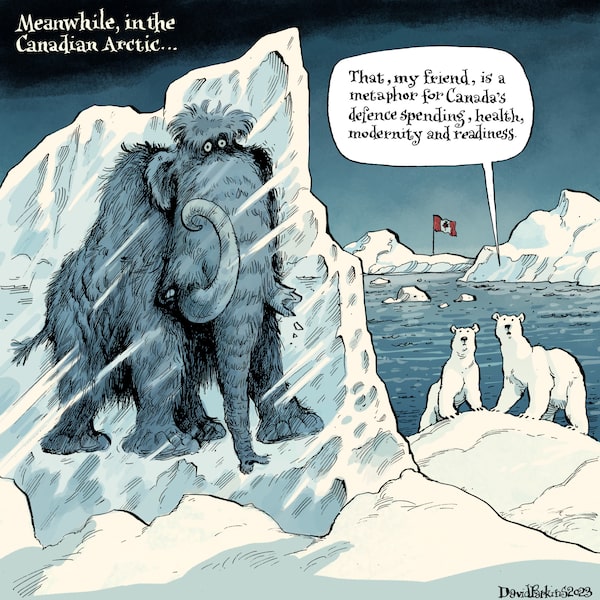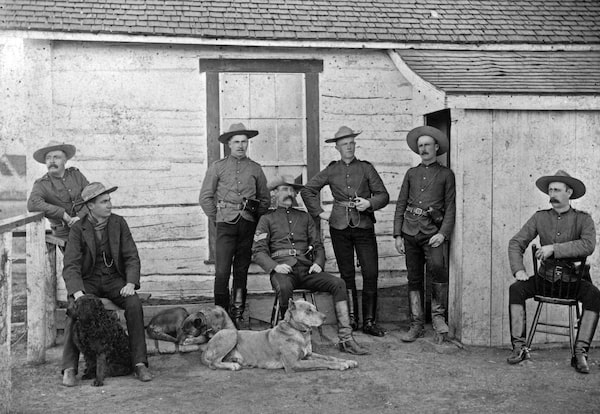Good morning,
Canada’s largest ever federal worker strike is over, after the Public Service Alliance of Canada announced it reached a tentative contract agreement with the Treasury Board early Monday.
However, PSAC says strike action continues for 35,000 Canada Revenue Agency workers nationwide, with contract negotiations ongoing.
More than 100,000 union members walked off the job on April 19 after the union and government failed to reach new contract deals for agreements that expired in 2021.
Members of the Public Service Alliance of Canada picket outside Place du Portage in Gatineau, Que., Friday, April 28, 2023.Justin Tang/The Canadian Press
This is the daily Morning Update newsletter. If you’re reading this on the web, or it was forwarded to you from someone else, you can sign up for Morning Update and more than 20 other Globe newsletters on our newsletter sign-up page.
Evacuation in peril for Canadians stranded in Sudan after rescue flights halted
Canada and some of its allies halted evacuation flights from Sudan’s Wadi Seidna air field over the weekend, as escalating fighting between rival military factions made it too dangerous to continue.
There are roughly 230 Canadians still stranded in the country, and evacuation efforts are continuing on a step-by-step basis. The path to safety now runs through Port Sudan, the country’s main international trade hub perched on the Red Sea, a perilous 800-kilometre journey by road from the capital city of Khartoum.
Six Canadian Armed Forces flights departed over the past few days, evacuating approximately 550 people in total, including about 175 Canadian citizens and permanent residents, along with citizens of other countries. More than 210 Canadian citizens and permanent residents left on flights organized by allies.

Smoke billows over residential buildings in Khartoum on April 30, 2023 as deadly clashes between rival generals' forces have entered their third week.-/AFP/Getty Images
China views Canada as a ‘high priority’ for interference, CSIS report says
China sees Canada as a “high priority target” of foreign interference operation and uses incentives and punishments to further its interests, according to a top-secret intelligence assessment from the Canadian Security Intelligence Service.
The report warned that Beijing is the “foremost perpetrator” of foreign interference in Canada. Its agents are unconcerned about repercussions, the report says, because of the lack of obstacles such as a foreign-influence registry of the kind established in the United States and Australia.
A vehicle passes a sign outside the Canadian Security Intelligence Service (CSIS) headquarters in Ottawa, Nov. 5, 2014.Chris Wattie/Reuters
Calgary the key battleground with Alberta’s election set to officially start
Alberta Premier Danielle Smith is expected to officially start the 2023 general election campaign when the writs are issued on Monday. The UCP, under a its new leader, will face off against NDP Leader Rachel Notley, who is looking to win back government.
The governing United Conservative Party and the opposition NDP have been campaigning for weeks, although personality, rather than policy, has dominated the contest so far. Smith’s critics paint her as unpredictable and under the thumb of the right flank of the UCP, while doubters of the former premier, Notley, frame her as an enemy of the oil and gas industry, on which Alberta’s economic prosperity depends.
Voters go to the polls on May 29, and the outcome will largely be decided in Calgary, where observers expect the UCP to lose some – but not all – support.

This compilation photo shows Premier Danielle Smith (left) as she speaks at an economic forum in Calgary, Alta., April 18, 2023 and NDP Opposition Leader Rachel Notley as she addresses the Calgary Chamber of Commerce on Dec. 15, 2022.Jeff McIntosh/The Canadian Press
Got a news tip that you’d like us to look into? E-mail us at tips@globeandmail.com Need to share documents securely? Reach out via SecureDrop
Also on our radar
Russian attacks kill 34 in Ukraine, destroy dozens of civilian sites: Russia fired missiles at targets across Ukraine in its second major air strike in three days, setting a huge blaze in a southeastern district where officials said on Monday 34 people were wounded and dozens of homes damaged overnight.
Analysis: Ottawa’s vision for electricity’s future is about to clash with Ontario’s: An unprecedented push by the federal government to shape Canada’s power grid is about to ramp up – and face its first major test, courtesy of an Ontario government with a different view of electricity’s future.
Chinese migrants join flow of people crossing Darien Gap to seek asylum in U.S.: A swelling current of Chinese people have grown so disillusioned with the direction of their country that they are abandoning it, preferring to take their chances with a dangerous migration route instead.
B.C. pension plan targets Imperial Oil for Kearl spill: British Columbia Investment Management Corp., one of Canada’s largest pension-fund managers, is expressing its displeasure with Imperial Oil Ltd.’s handling of its environmental problems at its Kearl oil sands site by voting against two directors for re-election, including chief executive Brad Corson.
Maple Leafs and long-suffering fans finally exorcise playoff demons: When John Tavares’s seemingly harmless toss at the crease found its way into the back of the net in overtime on Saturday, the Maple Leafs and their long-suffering fans exorcised demons that had haunted them for two decades.
Morning markets
Tokyo gains: Shares advanced Monday in Tokyo while many world markets were closed. Public holidays around the globe limited initial global market reactions to the U.S. Federal Deposit Insurance Corp.’s announcement that regulators had seized troubled First Republic Bank. Japan’s Nikkei finished up 0.92 per cent. Wall Street futures were modestly positive just before 6 a.m. ET. The Canadian dollar was down slightly at 73.68 US cents.
What everyone’s talking about
Failure to regulate artificial intelligence will entrench Big Tech’s power over us
“It’s not just about the misinformation and loss of jobs that a lot of people fear. Absent regulation of AI, we risk further entrenching Big Tech’s dominance over the direction of our technologies.” – Kean Birch
Inflation is getting better – we just need to stop looking at year-over-year numbers
“While the year-over-year rate of inflation tells us something, it is a slow moving and largely distant measure of what is going on now. If we shorten the focal distance, we can use the seasonally adjusted measure of consumer prices, which allows us to get a sense of month-to-month changes.” – Peter Phillips
Today’s editorial cartoon

Illustration by David Parkins
Living better
What gift to buy for Mother’s Day this year
With weddings, baby showers, graduations and Mother’s Day around the corner, spring can be a busy gift-giving season for many of us. To help you get a head start on your shopping, we’ve put together four mini gift guides that are equal parts thoughtful and fun. Whether you’re buying for mom, a couple of lovebirds, a graduate or a new baby, we’ve got your next gift sorted.
Moment in time: May 1, 1895
Early days of the Mounties

North-West Mounted Police detachment, Pincher Creek, Alberta, 1895.RCMP Museum
For more than 100 years, photographers and photo editors working for The Globe and Mail have preserved an extraordinary collection of news photography. Every Monday, The Globe features one of these images. This month, we’re looking at the RCMP, on the occasion of its 150th anniversary.
In 1870, after Canada’s land mass mushroomed with the purchase of Rupert’s Land – Manitoba, parts of Saskatchewan, Alberta and the north – the federal government realized it needed to maintain law and order on the frontier. Thus, on May 23, 1873, the government created the North-West Mounted Police. Prime minister John A. Macdonald described the NWMP’s mandate as “the preservation of peace and the prevention of crime.” The officers needed to read and write either English or French, and know how to ride a horse. Their first task was to end the violent whisky trade on the Southern Prairies. Order was restored. As the territories grew, so did the NWMP’s role with more outposts and Mounties. It put down the North-West Rebellion and kept the peace for the Klondike Gold Rush. The force added the prefix, “Royal,” in 1904 and was renamed the Royal Canadian Mounted Police in 1920. Philip King.
Read today's horoscopes. Enjoy today's puzzles.
If you’d like to receive this newsletter by e-mail every weekday morning, go here to sign up. If you have any feedback, send us a note.